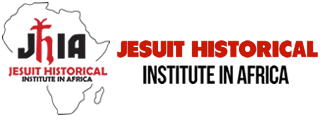 Jesuit Conference of Africa and Madagascar (JCAM) in collaboration with Jesuit Historical Institute in Africa (JHIA) convened an online meeting on the 10th of September 2024 to Address Challenges in the Management of Jesuit Archives. The representation was drawn from different provinces and region of JCAM establishment which are West Africa (AOC), Central Africa (ACE), Southern Africa (SAP), Madagascar (MDG), Rwanda Burundi (RWB), Northwest Africa (ANW) and Eastern Africa (AOR). Also present were our partners in Rome- Archivum Romanum Societatis Iesu (ARSI) and Francophone Europe.
Jesuit Conference of Africa and Madagascar (JCAM) in collaboration with Jesuit Historical Institute in Africa (JHIA) convened an online meeting on the 10th of September 2024 to Address Challenges in the Management of Jesuit Archives. The representation was drawn from different provinces and region of JCAM establishment which are West Africa (AOC), Central Africa (ACE), Southern Africa (SAP), Madagascar (MDG), Rwanda Burundi (RWB), Northwest Africa (ANW) and Eastern Africa (AOR). Also present were our partners in Rome- Archivum Romanum Societatis Iesu (ARSI) and Francophone Europe.
In a welcome address, Rev. Dr. Jean Luc Enyegue, SJ, the director of JHIA mentioned that the last physical meeting happened in the immediate of Pre-Covid 19 in 2020, in Nairobi Kenya and the discussion was about Setting Up an Archive, and an excellent presentation was given by Ms. Barbara and representatives of different provinces and region. The meeting was really fruitful, because many participants at the time, those who were in charge of archives, it was really a learning experience to understand their job as archivists or supervisors of the archives, and to also raise the kind of challenges they were facing in their respective jobs. since then, we published some operational guidelines which have been adopted by different provinces based on their particular situation. He said that the forum is unique because it gives each participant the opportunity to listen to each other about what is happening in respective archives.
Dr. Enyegue continued to say that he was also aware that some provinces have really made major reforms in terms of archiving, and yet he also understood that in the conference, there is still a lack of qualified staff for the respective archives in different provinces, some of course, are better off than others. Another challenge since 2020 that draws us back has been in the extraordinary turnover for Socii of the conference. Among the Socii who attended the meeting in 2020 only one is still around, who was the incoming Socii of AOR, that means since 2020 every single province of Africa, Madagascar, has a different Socii, which also means that it was really urgent for us to get together, to meet each other.
Fr. Guy Savi, SJ made a presentation of AOC archives in which he highlighted the progress he has made, but also the challenges he’s facing. During his presentations, it was realized that the management of Jesuit archives faces a myriad of challenges that demand innovative solutions to ensure the preservation and accessibility of critical historical records. One of the primary concerns is limited funding, which hampers the ability to adequately maintain and protect these archives. A potential solution is to pursue funding through well-crafted proposals, targeting grants or donors interested in historical preservation. Another significant challenge is the threat posed by pests, which can damage or destroy books and documents. To combat this, fumigation and ongoing pest control measures must be implemented to safeguard the collections from such threats.The embargo on documents, specifically the rule that archives can only be accessed 15 years after the death of a Jesuit, creates difficulties in timely research and access. A potential solution involves creating a structured timeline that allows archivists and Soccii to prepare these documents for eventual release while adhering to the set guidelines.
Expertise is often another limiting factor, as archivists require specialized knowledge in order to effectively manage these collections. It is essential to invest in training or hire professionals with the requisite skills. Moreover, differentiating between personal and official documents is a challenge. Establishing separate archives for personal and official records would streamline the categorization process and avoid confusion. The reluctance to place archives on the internet due to piracy concerns presents another modern challenge. A balance must be struck between digital accessibility and security. Perhaps creating restricted digital platforms with strong encryption could offer a way forward, allowing controlled access while preventing unauthorized dissemination.Moving archives across jurisdictions can also lead to inconsistencies. To address this, standardized procedures should be developed to maintain the continuity and integrity of the archives, regardless of location.
Furthermore, maintaining original copies of archives as a fallback in case of disaster is crucial to preserve irreplaceable records.The Jesuit archives often consist of a mix of living and deceased members’ records, including letters and emails, which can create organizational difficulties. A clear template for archiving these records should be developed, differentiating between active and historical data. Access to these archives should be regulated, allowing Provincials and Socii clear guidelines for usage.
Developing a comprehensive management table specifically for archives of deceased members is another essential step toward proper organization. Archivists must also recognize that no single solution fits all cases; compromises between space limitations and necessity will often be required.
Finally, the archives’ responsiveness must be improved. Providing access to critical documents within one or two days is an ideal benchmark to aim for, ensuring that the archives remain functional and accessible for those who need them.
Geoffrey Obatsa
Administrative Assistant – JHIA





